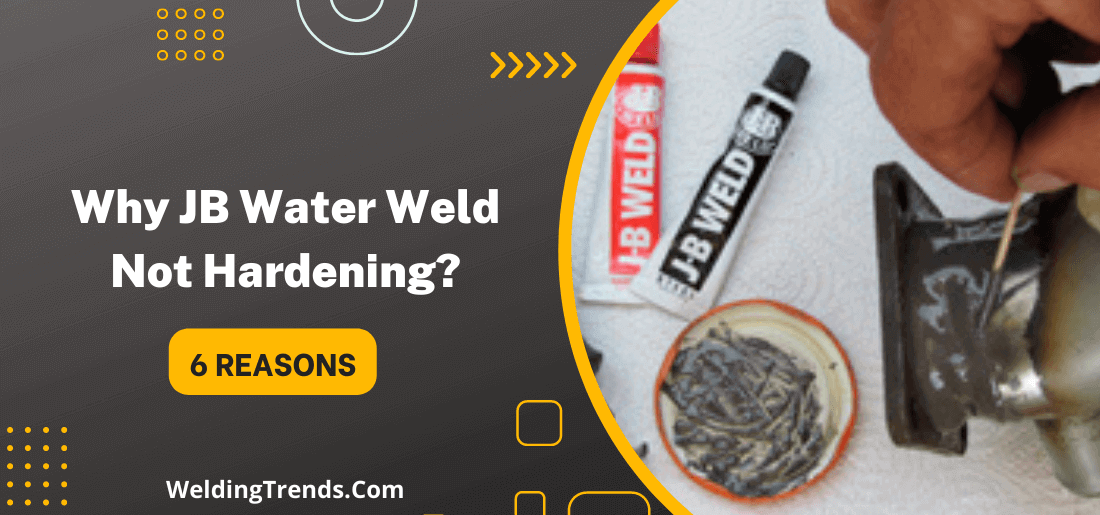On the surface, it would seem that water welding is a simple process: Just weld two pieces of metal together and add water. So why does my JB water weld not harden? After all, I followed the instructions perfectly!
Well, there are a few things you need to know about JB water welding before you try it yourself.
This blog post will explore some of the possible reasons why JB water weld may fail to cure properly. By understanding the causes of this problem, you can take steps to prevent it from happening and ensure your repairs hold up over time. Read on for more information!
reason why JB water weld may not harden?
Following are the reasons why your JB water weld may not be hardening
1. You didn’t use enough water
When you are mixing the JB water weld, it is important to add enough water so that the ratio of powder to liquid is 3:1.
If you don’t add enough water, the mixture will be too thick and will not harden properly. Make sure to add the water slowly and mix it well so that you don’t end up with a runny mixture.
2. water was too hot or too cold
If the water you used to mix the JB weld was too hot or too cold, it can affect the curing process. The ideal temperature for mixing JB weld is between 70-80 degrees Fahrenheit.
If the water is too hot, it can cause the mixture to set too quickly and not cure properly. On the other hand, if the water is too cold, it can make the mixture harder to mix and more difficult to work with.
3. You didn’t mix the JB weld properly
It is important to mix the JB water weld thoroughly so that the powder and liquid are fully combined. If you don’t mix it well, the mixture will be uneven and will not cure properly. Make sure to mix it for at least 2 minutes so that the ingredients are fully combined.
4. You used too much or too little JB weld
When you are mixing the JB weld, it is important to use the correct amount. If you use too much, the mixture will be too thick and will not cure properly.
On the other hand, if you use too little, the mixture will be too runny and will not hold together well. The ideal ratio of JB weld to water is 3:1.
5. You didn’t apply JB weld properly
Once you have mixed the JB water weld, it is important to apply it correctly so that it will adhere properly and cure correctly.
Make sure to follow the instructions on the package and apply the weld to a clean, dry surface. If the surface is not clean, the JB weld will not adhere properly and will not cure correctly.
6. You didn’t let JB weld cure properly
After you have applied the JB weld, it is important to let it cure for at least 24 hours so that it can be set properly. If you try to use it before it is fully cured, it will not be as strong and may not hold up over time.
Make sure to read the instructions on the package so that you know how long to let it cure. JB water weld is a great way to repair metal surfaces, but it is important to understand the causes of why it may not harden.
By taking the time to mix the ingredients properly, apply the weld correctly, and let it cure fully, you can ensure that your repairs will hold up over time.
How to fix the issue if the JB water weld does not harden?
If you find that your JB water weld is not hardening, there are a few potential causes that you can check.
- First, make sure that you have followed the instructions correctly and that you are using the correct proportion of water to the powder.
- Next, check to see if the water weld was mixed properly – it should be a smooth, consistent paste. If the water weld still isn’t hardening, it is possible that the materials you are trying to bonding are not compatible with the JB water weld.
- Lastly, ensure that you are giving the water weld enough time to harden – depending on the circumstances, it can take up to 24 hours for the water weld to reach its full strength.
If you have followed all of these steps and the water weld still isn’t hardening, you may need to consult with a professional to resolve the issue.
Why doesn’t the weld harden after curing?
The reason the weld doesn’t harden after curing is that the heat from the welding process hasn’t had time to fully penetrate the metal and work-harden it.
If you were to allow the weld to cool slowly, however, it would eventually harden. Post-weld heat treatment (PWHT) can also be used to harden the weld.
Be sure to consult your welding engineer or metal supplier to see if PWHT is necessary for your particular application.
Welding engineers and metal suppliers can also recommend preheating the metal before welding, which can help reduce the risk of cracking.
If you’re not sure whether or not your weld needs to be heat-treated, it’s always best to err on the side of caution and consult a professional.
Alternatives to JB water weld that can be used in similar situations
JB water weld is a great product for repairing leaks in PVC pipes, but there are a few other products on the market that can be used in similar situations. Some of these alternatives include:
Each one of these products has its own set of advantages and disadvantages, so be sure to choose the one that best suits your needs.
1) Plumber’s putty
Plumber’s putty is a popular choice for repairing leaks in PVC pipes because it is easy to use and can be found at most hardware stores. However, it is not as strong as the JB water weld and may not be able to hold up to heavy use.
2) Silicone caulk
Silicon caulk is another option that can be used to repair leaks in PVC pipes. It is more durable than a plumber’s putty and can be applied directly to the leak. However, it is more difficult to apply than a plumber’s putty and may not adhere as well to some surfaces.
3) Epoxy putty
Epoxy putty is a more permanent solution for repairing leaks in PVC pipes. It is stronger than both plumber’s putty and silicone caulk, but it can be difficult to apply and may not adhere well to some surfaces.
4) Plumber’s tape
Plumber’s tape is a less common choice for repairing leaks in PVC pipes, but it can be just as effective as the other options. It is easy to apply and can be found at most hardware stores, but it is not as strong as epoxy putty and may not adhere well to some surfaces.
FAQs – Why JB water weld not hardening?
How long does it take for JB Weld to get hard?
JB Weld typically sets in 4-6 hours, however, it can take up to 24 hours for the bond to reach full strength. For best results, allow the JB Weld to be set for at least 6 hours before applying any force or stress to the repair.
Is JB Water Weld a permanent fix?
JB Water Weld is a permanent, waterproof repair putty that sets in just three to five minutes. Once it has been set, it can be drilled, tapped, filed, machined, and painted. It is ideal for repairing cracks, leaks, and holes in plumbing fixtures, tanks and outdoor gear. Best of all, it can be used on both wet and dry surfaces.
So, if you’re looking for a quick and easy way to fix a leak or hole, JB Water Weld is the perfect solution.
Will JB Weld stop a water leak?
JB Weld will not stop a water leak. It is not designed to be used in that way and will not work properly if used in that manner.
If you have a water leak, you should consult a professional to fix the problem. JB Weld can be used to repair many things, but it is not a solution for everything.
Does JB Water Weld work underwater?
JB Water Weld will work underwater as long as the area is well-ventilated. It is important to note that JB Water Weld is not designed for use in salt water.
If you are using JB Water Weld in a pool or spa, be sure to drain the area first and allow it to dry completely before applying the product.
Wrap Up
JB water weld is a great adhesive for many projects, but it will not harden after curing. This means that it should not be used as a structural adhesive or in high-stress applications.
However, the JB water weld is perfect for many household repairs and fixes!
JB water weld is not a permanent fix and it will eventually harden. However, if you are careful it can be a temporary fix until you can get the part replaced.
Always test your repairs in a safe place before using the repaired item in its intended way. Although the science of water welding is still being explored, it is clear that this process has potential benefits for both personal and industrial use.




